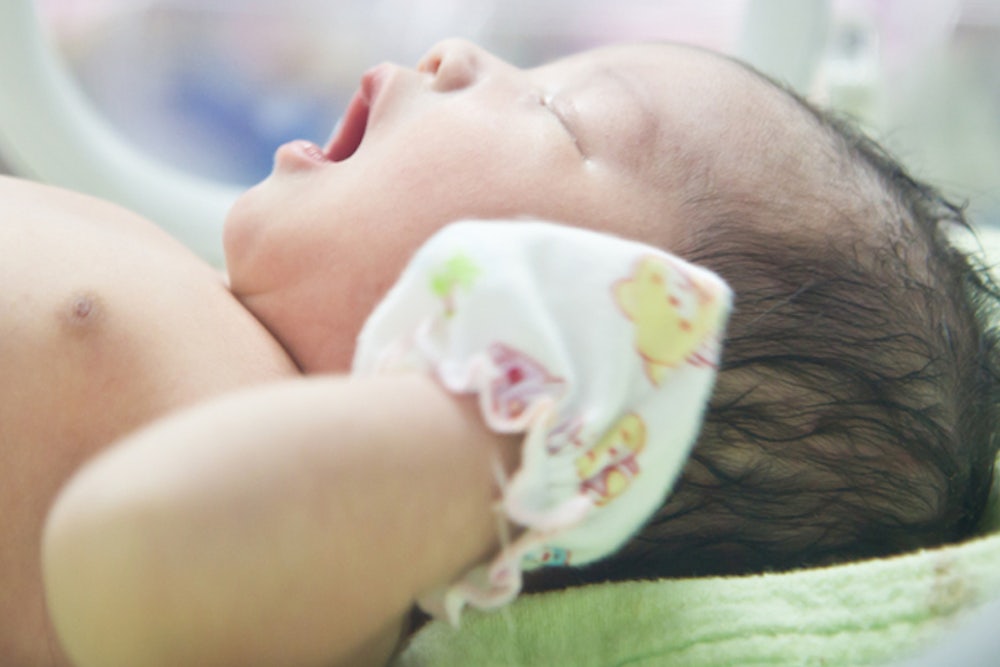This piece originally appeared on www.newstatesman.com.
A new law, which came into force today in Germany, provides that the box on a birth certificate specifying a child's gender should be left blank in cases where the child is neither obviously male nor female. This will, an Interior Ministry spokesman explained, "take the pressure off parents to commit themselves to gender immediately after birth"—thus allowing for greater delay before drastic, life-defining and perhaps mistaken surgery is carried out on an infant too young to decide for itself what it wants to be.
Such legal acknowledgement of the existence of intersex conditions, which have been known about for all recorded history, comes surprisingly late. Germany is the first country in Europe, and only the second in the world after Australia, to pass such a law. (Australian law is in fact more advanced, allowing people a third option—designated X—on all official forms.)
Awareness of intersex issues has attracted some official notice elsewhere, but only fairly recently. This summer, the EU stipulated for the first time that intersex people should be included in anti-discrimination law, while earlier in the year the UN Special Rapporteur on torture called for a ban on "forced genital-normalising surgery." Yet intersex people remain excluded from our own Equality Act, and when the German proposals were first brought forward there was criticism from some that they would create a legally-defined "third sex."
In the event, the new law has left some intersex campaigners unsatisfied. For them, the main issue remains the practice of surgical intervention to definitively assign gender and thus "correct" the apparent mistakes of nature. Intersex activists accuse doctors of interfering with nature, of making arbitrary judgements based on aesthetics or to fit cultural norms, of calling it wrong (in some cases, surgically-corrected "girls" grow up to identify as male, or vice versa) and of indulging in practices equivalent to the genital mutilation widely condemned when performed for religious or tribal reasons. Silvan Agius, for example, writes that "Surgical or hormonal treatment for cosmetic, non-medically necessary reasons must be deferred to an age when intersex people are able to provide their own free, prior and fully informed consent... The right to bodily integrity and self-determination should be ensured and past abuses acknowledged."
This is the core of the problem. On one level, humanity has become a great deal more enlightened since Roman times, when the birth of a "hermaphrodite" might be interpreted as an omen of war or natural disaster and the child was liable to be exposed, or since the Middle Ages when such an "unnatural" birth could be seen as evidence of the sin and perversion of the parents. Modern science recognises that biology in its infinite complexity doesn't care about the neatness of human thinking with its love of binary categories. Being of indeterminate gender is not in itself a disability.
To a first approximation, of course, human beings come in two sexes, but contrary to popular wisdom (or bestselling pop psychology) men and women are not separate species and don't come from different planets. Biological sex doesn't even always come down to chromosomes, but rather results from the subtle interplay of genetics and embryology. There are physically normal-looking males who have two X chromosomes and physically normal-looking women with who are XY - though such extreme examples of sexual crossover are thought to extremely rare. (Typically, they only come to light when the people involved, who are sterile, show up at fertility clinics.) More common are children born with ambiguous genitalia - testes that might be ovaries, an unusually large clitoris that might, from another point of view, be an unusually small penis.
How many children are intersex is a matter of dispute, and also of definition. One in 4,000 is a commonly accepted figure, but Anne Fausto-Sterling of Brown University has argued that it might be as many as one in 70. Taking a polemical stance on the issue, she has written that "male and female stand on the extreme ends of a biological continuum" and that "if nature really offers us more than two sexes, then it follows that our current notions of masculinity and femininity are cultural conceits."
But the biology, and the experiences of intersex people assigned at birth to what they grow up to believe is the wrong gender, may tell a different story: that you can't arbitrarily assign decide that a child is a boy or a girl and expect it to conform to the cultural expectation. The problem with surgical intervention isn't just the theoretical one that it violates the integrity of the body but the practical one that the doctors might well make a mistake. The answer, say campaigners, is to hold off both legal gender assignment and surgery until the child is old enough to make up its own mind as to whether it's a boy or a girl - or something in-between. Yet such a child, in our gender-obsessed culture, is likely to feel confusion and face prejudice. The stigma of "abnormality" can cause deep psychological scars: every child has a right to feel normal, and social expectations of gender can make it difficult to feel normal in a body that is not unambiguously male or female. Tackling that will be a much larger problem than a simple bureaucratic fix.
This piece originally appeared on www.newstatesman.com.
